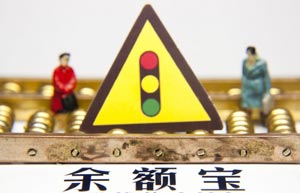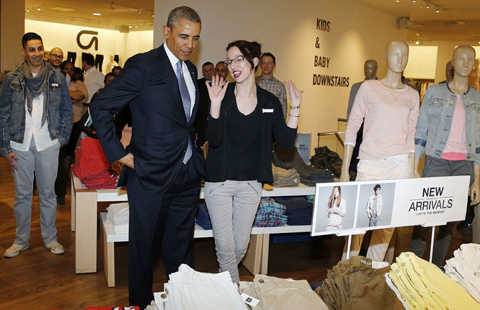PBOC puts brakes on online payments
Updated: 2014-03-14 13:29
By HE WEI in Shanghai and JIANG XUEQING in Beijing (chinadaily.com.cn)
|
||||||||
China's central bank hit the brakes on burgeoning virtual credit card services and barcode-based mobile payments, as competition for the country's Internet finance services becomes cutthroat.
The People's Bank of China issued a statement on Friday that halted virtual credit card products and face-to-face payment services including QR code payments.
Citing security concerns, the directive also banned financial institutions from setting up accounts on third-party payment platforms, including Alipay and Tenpay, the payment niches of Internet giants Alibaba Group Holding Ltd and Tencent Holdings Ltd.
Feng Xinya from the payment and settlement department of PBOC told China Daily on Friday that the central bank issued an official document on Thursday to its branches that are responsible for regulating financial services provided by Alibaba and Tencent.
"We asked the relevant online payment service providers to submit documents analyzing the security of their virtual credit card and QR code payment services. Then we will undertake a security risk assessment. During the process, we told the relevant companies to stop providing such services temporarily," Feng said.
She said further studies are needed to assess the security of such services and the PBOC has the responsibility to regulate new business models.
Alibaba and Tencent were not available for comment when approached by China Daily on Friday.
To facilitate smoother digital transactions, the Internet duo both announced on Tuesday that they will allow "payment by credit" for users of third-party payment processors.
Both firms are partnering with mid-sized lender China Citic Bank and Zhong An Online Property Insurance Co, a joint venture co-invested by the pair along with Ping An Insurance (Group) Co of China Ltd, the world's second-largest insurer.
Unlike physical credit cards, the online service will be bundled with users' Alipay or Tenpay accounts, allowing companies to assess customers before issuing lines of credit.
Chinese Internet conglomerates are heavily promoting online-to-offline payments as they expand into each other's turf.
By scanning barcodes embedded in the respective mobile apps WeChat and Taobao Wallet, users can purchase items from brick and mortar stores using their smartphones.
To allow them to engage in financial services, Alibaba and Tencent each won one of the first regulatory licenses in the country to run private banks.
|
 |
 |

 Nose gear on plane collapses at Philly airport
Nose gear on plane collapses at Philly airport
 US Black Sea naval drills start near Crimea
US Black Sea naval drills start near Crimea
 Cooperation at the heart of win-win, Li tells world
Cooperation at the heart of win-win, Li tells world
 Prayers for missing flight MH370
Prayers for missing flight MH370
 US first lady promotes film
US first lady promotes film
 Who's got the No 1 Chinatown in the US?
Who's got the No 1 Chinatown in the US?
 Obama sweats over sweaters during shopping
Obama sweats over sweaters during shopping
 Chinese arcade games on display
Chinese arcade games on display
Most Viewed
Editor's Picks

|

|

|

|

|

|
Today's Top News
China, US 'should stress' mutual interests
Search for MH370 may expand to Indian Ocean
US warns Russia of 'serious' steps
Feinstein gives a wake-up on spying
Satellite images not of MH370 crash: officials
Nevada woos Chinese investment
China defends South China Sea action
Nobel laureate: Beijing reform policies 'dynamic and flexible'
US Weekly

|

|









